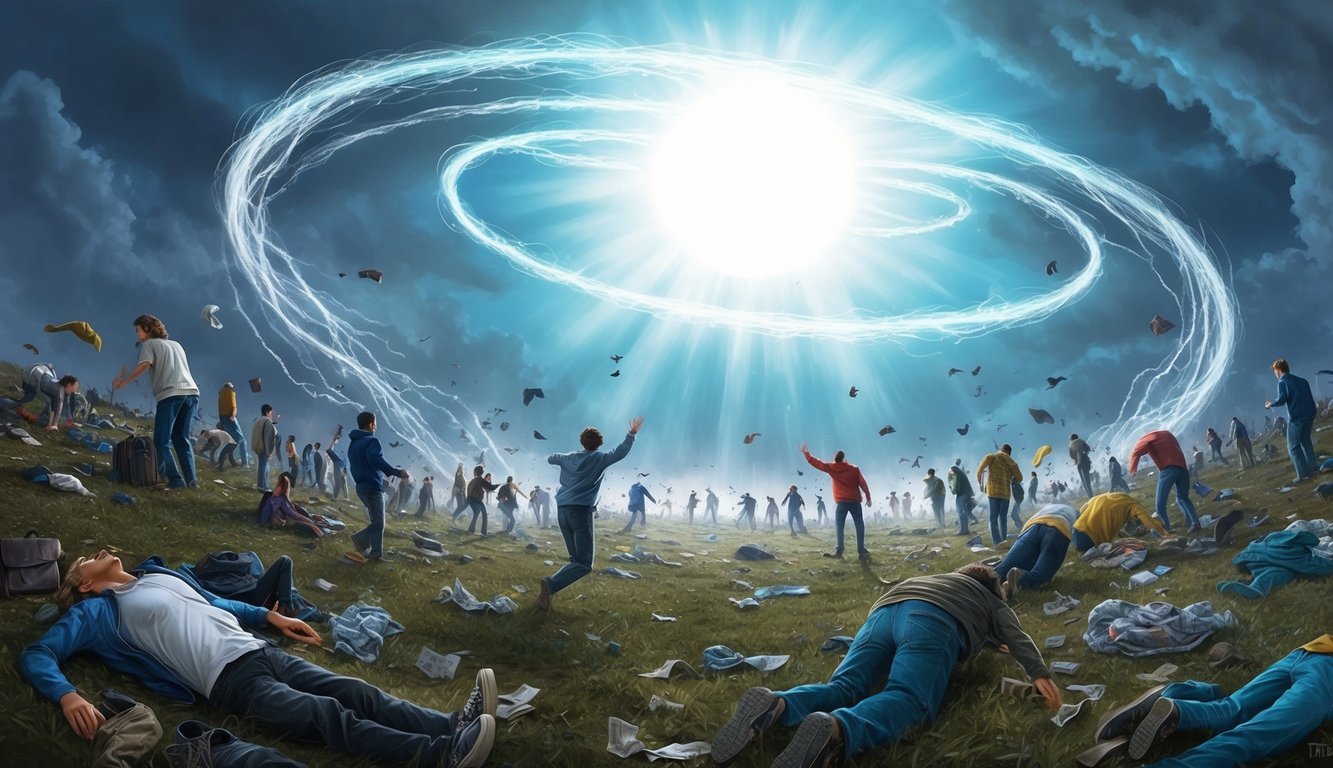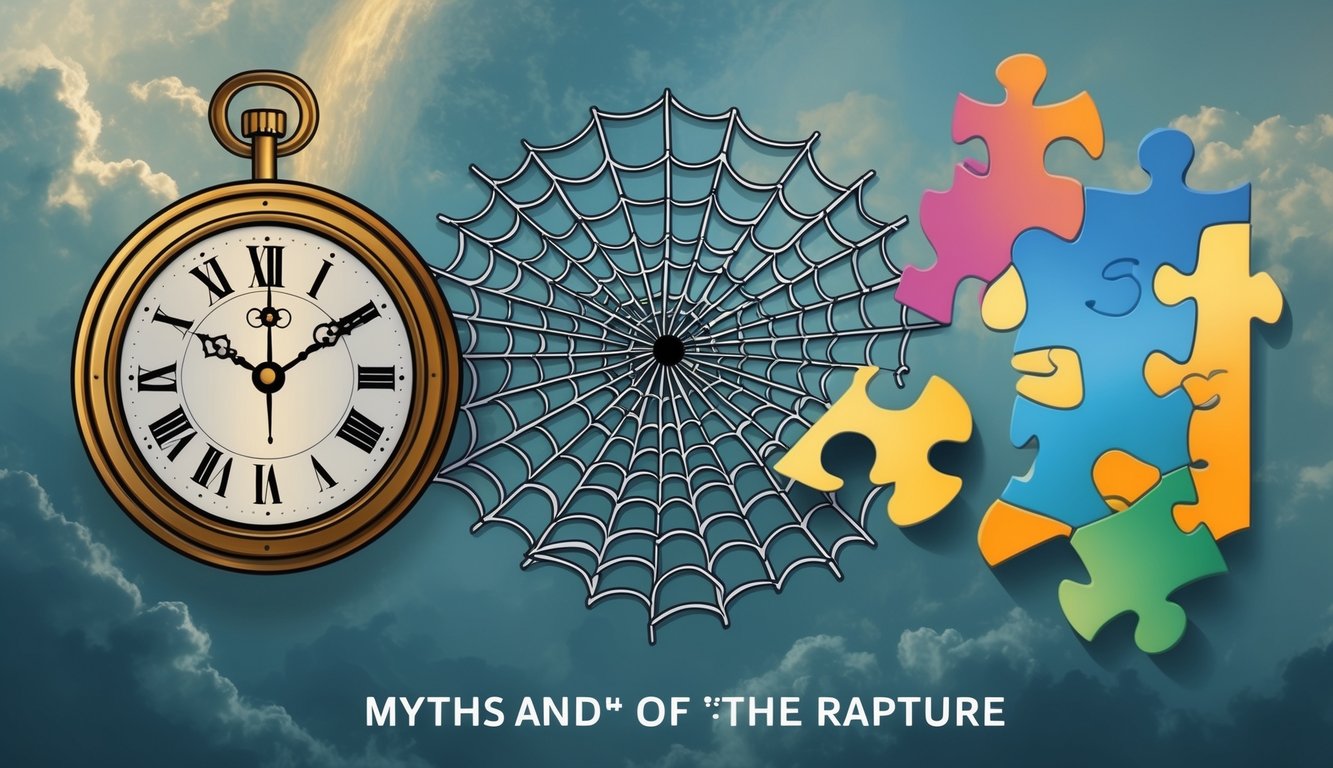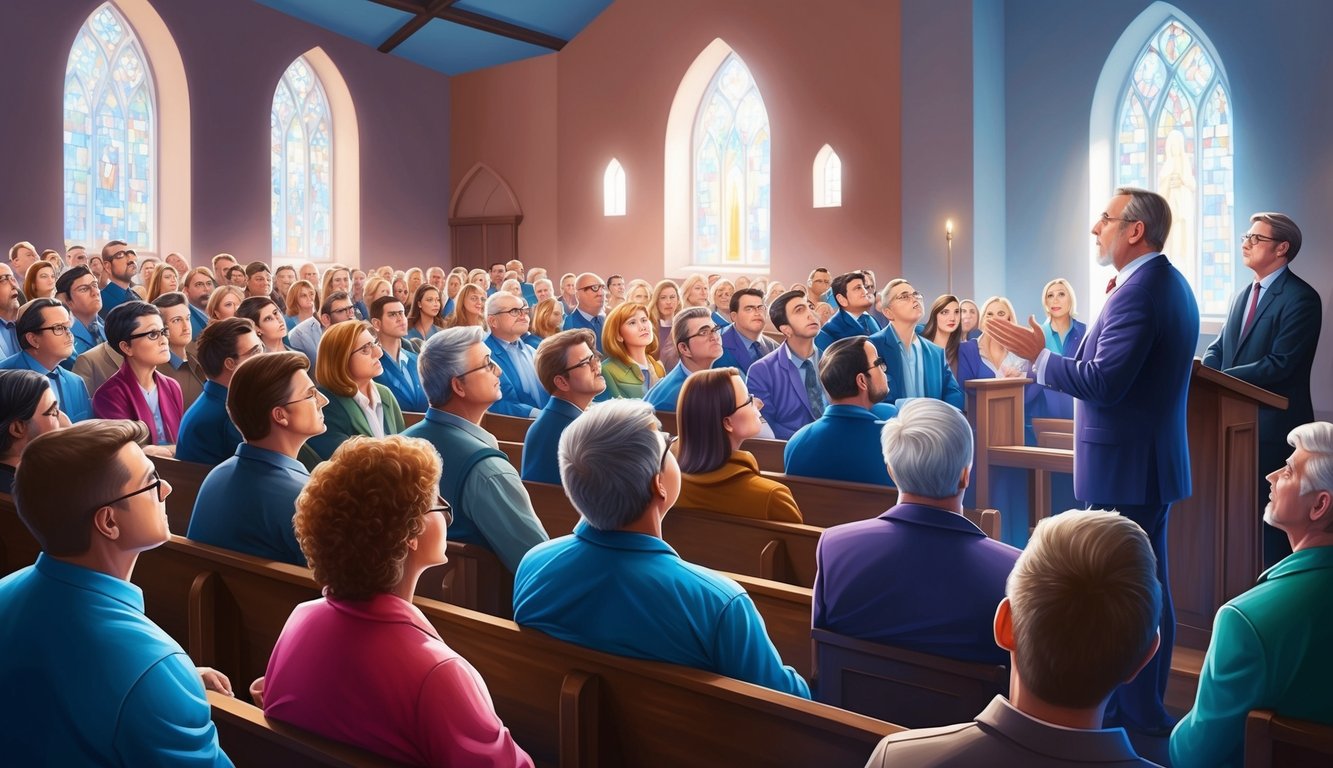Don’t Miss Out On This Unique Astrological Opportunity
Are you tired of spinning your wheels and getting nowhere? Simply put, you’re out of sync: you’re out of alignment with your astral configuration.
But: there’s a kind of map that can help you reclaim your alignment. Think of it as your own personal blueprint to success and happiness: a blueprint that will help you live your most amazing life.
Get started here.
Many people have questions about the Rapture, a concept often discussed in Christian circles.
Some misunderstandings can lead to confusion about what it truly means and what to expect. You need to clarify these myths so you can have a more accurate view of this event in Christian beliefs.

In this article, you will discover five common misconceptions about the Rapture.
These myths can shape how you perceive end-times events and your faith journey.
Understanding the truth can help deepen your knowledge and provide peace of mind as you navigate these topics.
1) The Rapture is Instantaneous

Many people think the Rapture will happen in the blink of an eye.
This idea stems from popular beliefs, but it might not be entirely accurate.
In some teachings, the Rapture means all believers are taken away right away.
You might picture a sudden event where everyone disappears.
However, the Bible does not clearly state a specific moment or how quickly events will unfold.
Different Christian denominations interpret these teachings differently.
Some suggest there will be signs or events leading up to the Rapture.
This means it may not be instantaneous, as some believe.
You should look at what the Bible says and consider the various viewpoints.
The focus should be on being prepared and living a good life, no matter how and when the Rapture happens.
Understanding these perspectives can help you think more deeply about your beliefs.
You might find comfort in knowing that many people share your questions and feelings about this topic.
Only True Believers Will Be Taken

Many people think that only certain individuals will be taken in the Rapture.
This idea suggests that only the best or most devoted Christians will be included.
However, the belief is more complex.
It’s often said that all who truly believe in Jesus Christ will be part of the Rapture, not just a select few.
This means that if you have faith in Him, you are included.
Some interpretations imply that those who have not accepted Christ will be left behind.
This can create worry, but it’s important to remember that true belief is key.
Beliefs about the Rapture can vary widely among different Christian groups.
Some think it will happen silently and unexpectedly, while others have different views about who will be taken.
Faith and personal relationship with God are the main focus.
So, you can be confident in your place as a believer.
3) It’s Pre-Tribulation
Many people believe that the Rapture will occur before a time of great trouble known as the Tribulation.
This idea, often called the pre-tribulation rapture, suggests believers will be taken to heaven before hard times begin.
This belief is popular among some Christian groups, but it is not universally accepted.
Scripture doesn’t give a clear timeline for the Rapture in relation to the Tribulation.
Some argue that Christians may go through trials as part of their faith journey.
Verses like 1 Peter 4:17 remind us that suffering can happen for believers.
While some see comfort in thinking they will escape difficult times, others believe that enduring challenges can strengthen faith.
This shows different interpretations exist among Christians.
Some find encouragement in Bible verses for daily life that emphasize perseverance and resilience during hardships.
Others focus on scriptures that offer hope and reassurance, believing that faith can provide peace even in the most difficult situations.
These differing perspectives highlight the diverse ways Christians interpret and apply their beliefs in everyday life.
The thought that the Rapture must happen before the Tribulation often stems from teachings that began in the 19th century.
It’s important to explore various viewpoints and study the Bible for deeper understanding.
By doing your own research, you can form your own beliefs about the Rapture and its timing.
4) The Date Can Be Predicted

Many people believe that the date of the Rapture can be known in advance.
This idea leads to a lot of confusion and speculation.
In reality, predictions about the Rapture’s timing have been made numerous times throughout history, and they have always been wrong.
Jesus Himself said, “It is not for you to know the times or dates” (Acts 1:7).
This means that trying to predict a specific date goes against His teachings.
Instead of worrying about dates, focus on living your faith each day.
Stay prepared and ready, just as Jesus encouraged.
This approach helps you to lead a meaningful life, regardless of when events may unfold.
The uncertainty reminds us to trust in God’s plan.
You can find comfort in knowing that the timing is in His hands, not ours.
Embrace the journey of your faith without the stress of guessing a date.
5) It’s an Exclusive Christian Event

Many believe the Rapture is only for Christians, but that isn’t entirely accurate.
While the Rapture is a significant event for believers, some interpretations suggest it may not be limited solely to them.
According to various teachings, God’s love and salvation are available to all people.
This means individuals from different faiths or those seeking a relationship with God may also be included in His plans.
The idea of exclusivity can lead to misunderstandings.
Some think only certain groups will experience the Rapture.
However, many believe the opportunity for salvation is open to anyone who seeks it earnestly.
It’s important to focus on love and unity rather than division among different beliefs.
The message of hope applies to everyone, regardless of their background.
Emphasizing inclusion can enhance understanding and foster connections between people of all faiths.
Keep in mind that interpretations vary widely.
It’s useful to explore different perspectives and remain open to learning from others.
Understanding the Rapture
The Rapture is a significant topic in Christian beliefs.
It involves the idea of believers being taken up to Heaven, often linked to end-times teachings.
Understanding its origins and modern interpretations can clarify common misconceptions.
Origins and Biblical References
The concept of the Rapture finds its roots in specific Biblical passages.
Key verses, like 1 Thessalonians 4:16-17, describe believers being “caught up” in the clouds.
This imagery suggests a sudden and transformative event.
The term “Rapture” itself is not found in the Bible but is derived from the Latin word “rapio,” meaning “to seize.” This reflects how believers are thought to be taken from Earth.
Different denominations interpret these passages in various ways, leading to confusion.
Interpreting the Rapture in Modern Times
Today, many people view the Rapture through various lenses.
Some believe it will happen quietly and unexpectedly, while others expect it to be a public event.
Various books, movies, and teachings have shaped these ideas, often blending them with cultural narratives.
Furthermore, the idea of the Rapture is sometimes incorrectly linked to the end of the world.
Instead, many interpretations suggest a moment where believers experience a divine moment of hope and reassurance.
Understanding these nuances can help clear up myths surrounding this doctrine.
Debunking Popular Myths
Many beliefs about the Rapture come from misunderstandings or misinterpretations of scripture.
It’s important to clarify these myths to have a better grasp of what is commonly believed.
The Misconception of Timing
One common myth is that the timing of the Rapture can be accurately predicted.
Many people mistakenly look for specific dates or signs that will indicate when it will happen.
Biblical texts do not support this idea.
For example, in Matthew 24:36, it clearly states that no one knows the day or hour of Christ’s return.
Rather than focusing on predictions, it’s better to be spiritually prepared at all times.
Misinterpretations can lead to confusion and fear.
Understanding that the Rapture’s timing is uncertain encourages a deeper faith and readiness without anxiety.
The Faithful and the Left Behind
Another popular myth suggests that only a select few will be taken in the Rapture, leaving many behind.
This idea can create fear and division among believers.
In reality, many different Christian denominations interpret the Rapture differently.
Some believe it is meant for all believers, not just a chosen few.
The key is to focus on living a faithful life, as teachings often emphasize personal relationship with God.
Embrace community and support each other in faith, rather than worrying about being left behind.
Frequently Asked Questions
Many people wonder about the rapture and what it means for their faith.
Several common questions arise regarding its signs, acceptance in different denominations, and its impact on lifestyle and culture.
What are the signs that the rapture is about to occur?
Some believers look for specific signs that might indicate the rapture is near.
These can include increased deception, false messiahs, and changes in societal behavior.
Events like natural disasters and moral decline are often seen as indicators in certain teachings.
Is the concept of the rapture universally accepted in theology?
Not all Christian denominations agree on the rapture’s existence or details.
Some see it as a vital part of end-times prophecy, while others focus solely on the second coming of Christ.
This differing perspective contributes to various beliefs about the end times.
How does the rapture differ from the second coming of Christ?
The rapture is often viewed as an event where believers are taken to heaven, while the second coming refers to Christ returning to earth to reign.
Many Christians believe these events are separate and have different purposes in God’s plan.
Are there specific denominations that emphasize the rapture more than others?
Yes, certain groups, especially in evangelical circles, place a strong emphasis on the rapture.
Churches that hold dispensationalist views often teach it as a key part of their eschatology, which shapes their interpretations of scripture and prophetic events.
What impact does belief in the rapture have on Christian lifestyle and worldview?
Belief in the rapture can influence how you approach daily life and moral decisions.
It can create a sense of urgency about faith and sharing the message of Christ, encouraging a focus on spiritual readiness and community outreach.
How has the idea of the rapture influenced popular culture and media?
Many books, movies, and shows have been inspired by the rapture.
Works like the “Left Behind” series have made it a popular topic in culture, sparking discussions about faith, end times, and what it means to be ready.
This blending of faith and media allows for broader conversations and interest in these beliefs.



